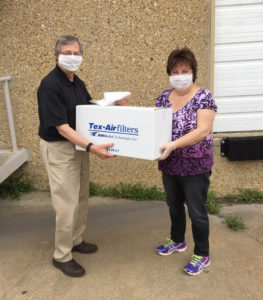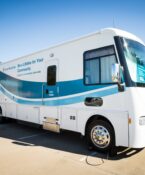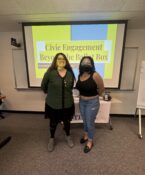‘We are not helpless’: HSC, Tex-Air Filters partner to make 100s of masks to fight COVID-19
By Diane Smith

Fort Worth businessman Jim Rosenthal is attacking COVID-19 as it charts a ruthless path across the United States with an army of crafty volunteers.
The mysterious disease moved into North Texas communities bringing a sense of helplessness, Rosenthal said, explaining he wanted to counter the dim outlook filling news reports.
“What could I do to help stem the tide of this tragedy?” asked Rosenthal, Chairman and CEO of Tex-Air Filters, which manufactures and markets HVAC filters.
His answer? Sew masks.
“We have the filtration media in our factory and the people who can make masks,” he told himself as a plan hatched.
Rosenthal’s plan brought Tex-Air Filters together with The University of North Texas Health Science Center at Fort Worth to make hundreds of masks. HSC Fort Worth will distribute them to vulnerable populations.
Already, Tex-Air Filters has donated high-efficiency filtration materials for mask-making kits to the university. The donated MERV 13 media is very effective at removing a whole range of different particle sizes, including those containing viruses, he said.
Each kit can produce up to 200 masks. The university expects the 30 mask kits donated will produce about 5,000 masks.
On Friday, HSC Fort Worth asked for volunteers to help sew masks via Facebook. Within an hour, 10 people volunteered to sew masks, said Community Education Specialist Katy Heesch.
“Since then, I have received 80-plus emails from folks wanting to help,” Heesch said.
The overwhelming response from people ready to sew tapped into a collective need to help, Rosenthal said.
“Why are we doing this?” Rosenthal said. “The answer is pretty simple – to show we are not helpless.”
‘Let’s make masks’
On March 20, Rosenthal and his business partner, Stevan Brown, came to the office with the same idea.
“Let’s make masks,” Brown said. “We can donate them to those in need.”
Rosenthal and Brown spent the next weekend trying to source materials and make prototypes. When they encountered a shortage of elastic, they discovered heavy-duty rubber bands worked.
The masks were in production by March 23, a Monday.
“By Wednesday we were making 100 masks a day and by Friday we were up to 300,” Rosenthal said. “We found that sewing was the best way to make the masks. We needed more sewers.”
Rosenthal said volunteers are picking up kits from his business. He also reached out to HSC Fort Worth to help figure how to get more masks to people who need them.
“We were aware that these are not certified N95 masks to be used by medical personnel in contact with coronavirus patients,” Rosenthal said. “However, the staff at HSC immediately recognized that the masks could help fill critical needs in other areas. They have worked with us to set up this program to recruit sewing volunteers.”
Looking for volunteers
Kelsi Willis, who graduated with a master’s degree in biomedical science from HSC Fort Worth in 2016, is a self-described sewing novice.
Willis, a pediatric cancer researcher at UT Southwestern Medical Center, worked as a scribe at a Fort Worth hospital emergency room for five years. She said making the masks is one way to help her former co-workers.
“I made a lot of friends and know they are working hard every day,” Willis said. “I’m hoping some of these masks reach them and help protect them as they work hard to heal those affected by COVID-19.”
Chery Lofton, a registered nurse from east Fort Worth, is also making masks with kits provided by Tex-Air Filters. She found the kits after searching online for filter materials to make a mask. She wanted to make one for her daughter, who is a critical care registered nurse in a COVID-19 unit in Dallas.
Lofton said her daughter is currently supplied with protective masks, but she is making her one as a precaution.
“There was no way my daughter was going to go without a mask,” said Lofton, who listens to Hall & Oates music while sewing the masks.
The masks may end up with nurse aids or helping people more vulnerable to the virus.
“It doesn’t matter who you make a mask for, if you save one life, that is really all that matters,” Lofton said.
![Uyen Sa Nguyen Scaled[58]](https://www.unthsc.edu/newsroom/wp-content/uploads/sites/16/Uyen-Sa-Nguyen-scaled58-145x175.jpg)




Social media